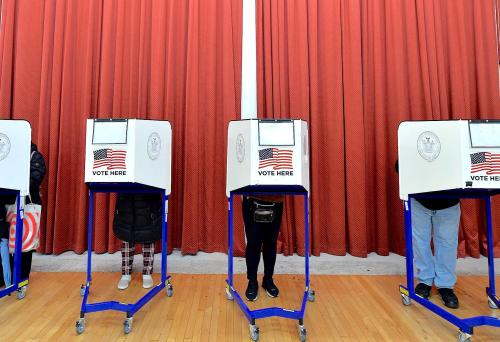As President Obama strode to the podium to deliver his 2015 State of the Union address, he had good reason to feel confident. Helped by a surge of job creation, and probably by lower gas prices as well, public satisfaction with the state of the economy and confidence in its future course had risen substantially during the past three months. Not coincidentally, so had the president’s job approval. Seemingly unfazed by his party’s rout in the 2014 midterm elections, he responded by going on the offensive with a series of bold executive orders and actions. And the White House’s innovative decision to release major policy proposals in advance of the speech garnered public attention, much of it favorable.
Still, as Mr. Obama began speaking, a key uncertainty remained: What balance would he strike between the desire to shape the political terrain for 2016 and the imperatives of governing in 2015? The former required bold initiatives, of a kind likely to evoke sharply negative reactions from Republicans who command majorities in both the House and the Senate. But successful legislating this year will require compromise with those very majorities. Could he thread the needle, making the Democratic political case for next year without undermining the possibility of legislative progress this year?
Mr. Obama delivered a clear, forceful, partisan speech whose substance stood in tension with his closing invocation of One America. In working to shape the political terrain for 2016, he may have weakened whatever prospects there were for meaningful cooperation with the opposition this year on issues other than trade.
The White House apparently believes that Republicans will be able to distinguish between agenda-setting rhetoric and the quieter process of legislation. Republican leaders probably can. Whether their rank-and-file will be able or willing to do the same is another matter.
Early in his speech, the president tried to crystallize the changing public mood. We’ve been through tough times over the part fifteen years, and for many, the tough times remain. “But tonight,” he declared, “we turn the page.” He dubbed 2014 a “breakthrough year” for the U.S. economy and cited the end of U.S. combat missions in Iraq and Afghanistan. Overall, he affirmed, “The shadow of crisis has passed.”
No doubt many Republicans would disagree, especially about the state of the world. And they would have a case. There is an arc of crisis from Europe to North Africa and throughout the Middle East. As the Unite States has retreated, the forces of oppression and anarchy have advanced. In recent surveys, majorities of Americans have expressed rising fears about terrorism and doubts that Mr. Obama’s approach to our adversaries has been tough enough. The president’s stated determination to avoid “costly wars that strain our military” may not reassure these skeptics. And his declaration that he would veto new sanctions on Iran while negotiations on its nuclear program continue will only bolster the determination of many legislators in both parties to enact those tougher measures.
When it comes to the economy, the president has a stronger case. Although wages remain stagnant and huge numbers of Americans have left the labor force, job creation accelerated in 2014, unemployment declined, and energy production surged. The budget deficit is down, at least for now. It is not a stretch to argue, as Mr. Obama did, that we are now “freer to write our own future than any nation on earth.” And he declared, in terms both parties now accept, that we must choose between economic growth that yields returns only for the few and growth that offers opportunity and progress to everyone willing to make the effort.
It was in laying out his script for the future that the president sailed into partisan waters. He repeated his calls for costly new initiatives to provide affordable, high-quality childcare and two years of free community college. And his proposal to pay for them with higher taxes on the wealthy will meet a stone wall of Republican rejection.
Still, Mr. Obama urged, there are—or ought to be—areas of possible agreement. Twenty-first century businesses, he said, need 21st century infrastructure—“modern ports, stronger bridges, faster trains, and the fastest internet.” This calls for a “bipartisan infrastructure plan.” The difficulty is that the leading proposals for financing this plan rely on proceeds from tax reform, which in turn requires compromise and negotiation across party lines. One doubts that many Republicans will view the president’s speech as providing the basis for agreement on taxes.
Mr. Obama was aware of the problem. There is bipartisan support for infrastructure and basic research, among other things. “Where we too often run onto the rocks is how to pay for these investments.” Unfortunately, his proposals to date are unlikely to break the deadlock.
Mr. Obama came closer to bipartisanship in his discussion of trade. He artfully transformed the controversy over a massive trade deal with Asia into a question of American leadership: either we will write the rules for commerce in the Pacific or the Chinese will. He asked both parties to give him trade promotion authority so that he can conclude these negotiations and bring them to the Congress for an up-or-down vote.
In a bow to his Democratic critics, he admitted that past trade deals “haven’t always lived up to the hype.” But that doesn’t mean that we can just refuse to enter into new ones. “Ninety-five percent of the world’s customers live outside our borders,” he reminded his listeners, “and we can’t close ourselves off from those opportunities.” But skepticism runs so deep within his own party that it will not be enough simply to request trade promotion authority. If he wants it, he will have to fight for it, vote by vote.
No doubt Republican critics will note the absence of any suggestions for stabilizing the finances of Social Security and Medicare, reining in the long-term budget deficit, or strengthening the military. But proposals on these fronts were not to be expected. It is fairer for them to complain that Mr. Obama focused more on redistribution than on growth, more on expanding government than on reforming it.
The Brookings Institution is committed to quality, independence, and impact.
We are supported by a diverse array of funders. In line with our values and policies, each Brookings publication represents the sole views of its author(s).



Commentary
State of the Union: Obama in Campaign Mode, Pushes Middle Class Agenda
January 20, 2015